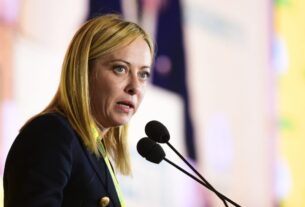BELFAST — British and European negotiators are working to agree “a way forward” on post-Brexit trade arrangements that will give Britain enough political cover to avoid snap elections in Northern Ireland, Irish Foreign Minister Simon Coveney said Wednesday.
Speaking after he met four of the five main parties in Northern Ireland’s crippled legislature, Coveney suggested that a framework agreement on simplifying EU-required checks at local ports could be announced on or shortly before October 28.
That date is the last day under existing rules of Northern Ireland power-sharing for a new cross-community administration to be formed at Stormont, the government base overlooking Belfast.
The main pro-British party, the Democratic Unionists, say they won’t permit this unless the EU agrees to end all checks and restrictions on British goods staying in Northern Ireland. The DUP declined to send any representatives Wednesday to meet Coveney, citing unspecified diary conflicts.
Britain’s secretary of state for Northern Ireland, Chris Heaton-Harris, has said he will be legally bound to set a date for new Northern Ireland Assembly elections on October 28 — exactly 48 weeks after the current assembly’s first deadlocked sitting — if the DUP doesn’t end its obstruction by then.
However, Coveney said this publicly rigid deadline could be set aside if ongoing London-Brussels dialogue overseen by U.K. Foreign Secretary James Cleverly and the European Commission’s point man on Brexit, Maroš Šefčovič, sufficiently narrows the ground between them.
Coveney noted that the existing law would require Britain to set a new Stormont election date “if there isn’t a way forward by the 28th.”
“I don’t think anybody wants to do that,” he told reporters at a hotel near Stormont.
However, he expressed hope that this “way forward,” outlining common ground already achieved and issues still to be resolved, could be published on or shortly before that date.
“We’re working hard to try to ensure that the Cleverly-Šefčovič teams focus on what is possible this side of the 28th of October,” Coveney told reporters.
The goal, he said, is to achieve enough U.K.-EU consensus within the next two weeks to provide “an alternative to a new election cycle in Northern Ireland.”
Leaders of four local parties – the center-ground Alliance Party, the Irish nationalists of Sinn Féin and the Social Democratic and Labour Party (SDLP), and the Ulster Unionists – said they agreed with Coveney that an election should be avoided if possible.
All recalled previous crises in Stormont power-sharing when British governments publicly set supposedly make-or-break deadlines for agreement, only to shift those deadlines to create more space for talks.
Alliance leader Naomi Long, justice minister in Northern Ireland’s currently leaderless government, said forcing her and other remaining ministers from their jobs on October 28 would needlessly create a political void “at a time of unprecedented crisis.”
Reflecting other parties’ bad blood with the Democratic Unionists, Long sparred online with DUP Agriculture Minister Edwin Poots, who avoided Wednesday’s meetings.
Ulster Unionist leader Doug Beattie called the October 28 deadline “artificial” and “really unhelpful” because it would discourage “good negotiations.”
“It will harden positions. It will drive people to the trenches,” he said, suggesting that any election re-run would strengthen hardliners at the expense of moderates.
In the May election, Sinn Féin overtook the DUP for the first time, putting outgoing Deputy First Minister Michelle O’Neill in line for the top post of first minister and reducing the DUP’s share of ministerial posts.
Several DUP figures told POLITICO at their annual party conference last weekend that they see a snap election as offering a potential opportunity to reverse that outcome. The DUP, which currently has 25 assembly seats versus Sinn Féin’s 27, would target up to three seat gains in the next election.




